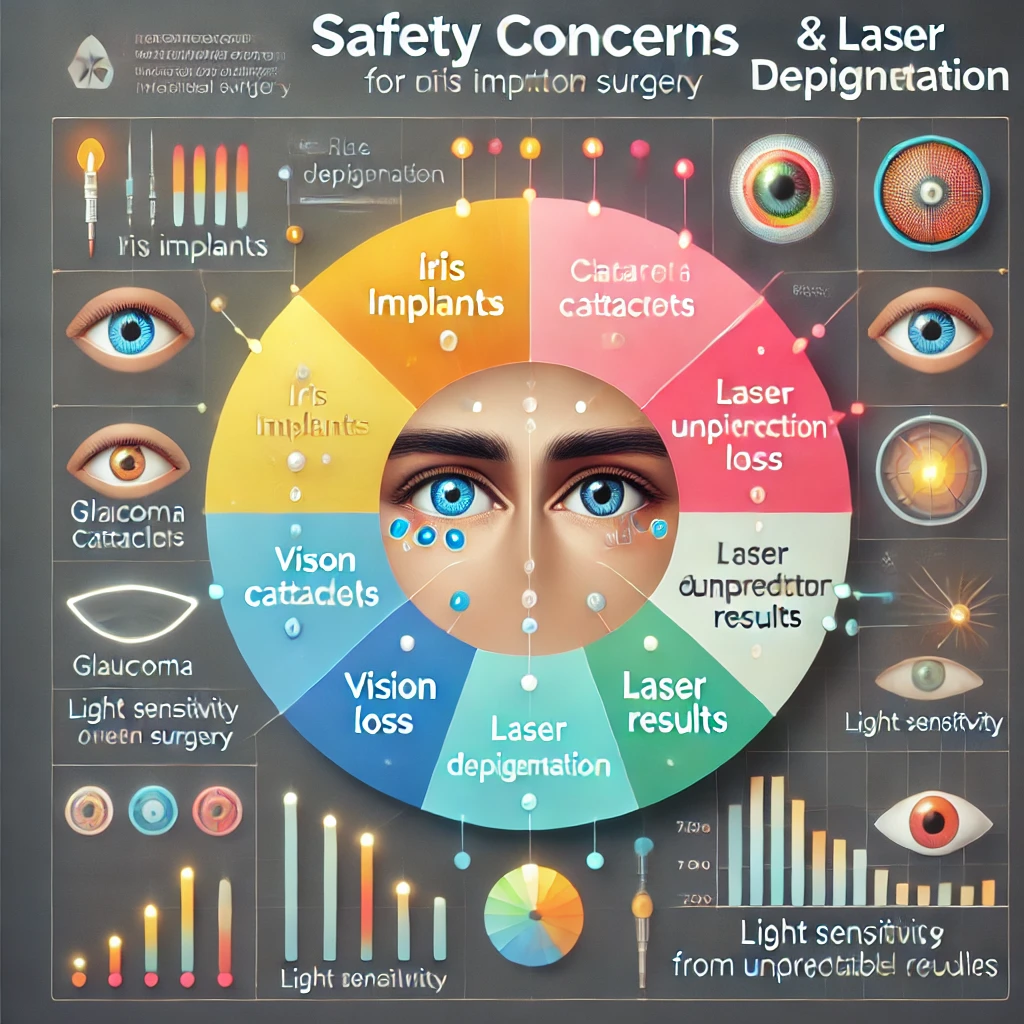Types of Eye Color Surgery: Implants vs. Laser

- What You’ll Learn in This Article
- What Is Eye Color Surgery?
- 1. Iris Implants
- 2. Laser Depigmentation Surgery
- 3. Keratopigmentation (Corneal Tattooing)
- Iris Implants: A Permanent Color Change
- Laser Eye Color Surgery: A Less Invasive Option
- Comparing Iris Implants and Laser Surgery
- Is Eye Color Surgery Safe?
- Final Thoughts: Which Eye Color Surgery Is Right for You? (H2)
Eye color surgery has become a popular topic of interest, especially with social media amplifying the curiosity surrounding cosmetic transformations. There are several ways to permanently alter your eye color, but two major options are iris implants and laser depigmentation. Below, we’ll explore each method, its risks, and whether one might be a better fit for you.
Let’s also enrich the article with some fascinating real-world data about these surgeries, including medical history, FDA status, and risks.
What You’ll Learn in This Article
In this article, we explore the differences between iris implants and laser eye color surgery, enriched with detailed insights into their history, risks, and current trends. By the end of this article, you’ll understand the benefits, drawbacks, and critical safety factors for each procedure.
What Is Eye Color Surgery?
Eye color surgery refers to procedures designed to permanently alter the color of the iris, the part of the eye responsible for color. While colored contact lenses offer a temporary solution, many individuals seek out permanent options, typically in the form of:
- Iris Implants
- Laser Depigmentation
- Keratopigmentation (less commonly known)
Eye Color Change Surgery: Types and Risks
1. Iris Implants
Artificial iris implanted into the eye.
Risks and Facts:
- Not FDA-approved for cosmetic use
- Can cause glaucoma, cataracts, corneal damage, and vision loss
- In a small study, most patients experienced complications
2. Laser Depigmentation Surgery
Uses laser to destroy pigmented cells in the iris.
Risks and Facts:
- Only applicable for brown eyes
- Not approved in the United States
- Long-term effects are unknown
3. Keratopigmentation (Corneal Tattooing)
Pigment injected into the cornea.
Risks and Facts:
- Most studied and developed technique
- Reports adequate levels of safety and efficacy
- Introduced centuries ago, but recently improved
Historical Context
Iris implants were originally developed for patients with damaged or missing irises.
Keratopigmentation has been used for centuries but has been refined recently.
Warning: In 2024, the American Academy of Ophthalmology issued a warning about the risks of these surgeries. Interest has increased due to social media viralization, but caution is strongly advised.
Iris Implants: A Permanent Color Change
What Are Iris Implants?
Iris implant surgery involves placing a synthetic iris into the eye to change its color. This surgery was initially developed to treat medical conditions like aniridia (absence of an iris) and coloboma (incomplete iris), but has since been adapted for cosmetic purposes.
- Procedure: A surgeon makes an incision in the cornea, folds a synthetic iris, and inserts it into the eye. The iris is then positioned to change the visible color.
- Cost: It usually ranges from $8,000 to $10,000.
- FDA Approval: Iris implants are not FDA-approved for cosmetic purposes due to the high risk of complications(Cleveland Clinic).
Risks of Iris Implants
Iris implants are highly invasive, and data shows that complications are not uncommon. According to recent studies, most patients undergoing iris implants reported side effects or needed revision surgery. Common risks include:
- Glaucoma: Increased pressure in the eye can lead to long-term damage to the optic nerve and blindness.
- Cataracts: A clouding of the eye’s lens is a frequent side effect post-surgery.
- Corneal Damage: Complications can result in irreversible vision problems or corneal transplants.
The Academy of Ophthalmology issued a warning in 2024, emphasizing the dangers of this procedure, especially for cosmetic reasons(

Advantages and Disadvantages of Iris Implants
Advantages:
- Permanent: The color change lasts forever, unlike contact lenses which need replacing.
- Versatile Color Options: You can select from a wide range of colors.
Disadvantages:
- High Risk: Significant potential for complications like glaucoma, cataracts, and vision loss.
- Invasiveness: The procedure requires surgery, which comes with all the risks associated with invasive procedures.
Laser Eye Color Surgery: A Less Invasive Option
What Is Laser Depigmentation?
Laser eye color change surgery is a newer method designed to lighten the color of the iris by removing the top layer of melanin. It is especially effective for those with darker eye colors like brown who want a lighter look.
- Procedure: A low-energy laser is used to heat and destroy the melanin in the iris. Over time, the body naturally absorbs the pigment, revealing a lighter color underneath.
- Cost: This procedure typically costs between $5,000 and $7,000.
- Availability: This procedure is not FDA-approved in the United States, limiting its availability(Verywell Health).
Risks of Laser Eye Color Surgery
While less invasive than implants, laser depigmentation still presents some concerns. Some of the known risks include:
- Light Sensitivity: Many patients report an increase in photosensitivity during the healing process.
- Unpredictable Results: The final color may not be uniform or as expected. Some patients may experience uneven pigmentation.
- Long-Term Risks: There is limited long-term data on this procedure, but concerns include iritis (inflammation of the iris) and potential vision complications(Verywell Health)(All About Vision).

Advantages and Disadvantages of Laser Eye Color Surgery
Advantages:
- Non-invasive: No incisions or surgeries are required, making it safer in the short term.
- Short Recovery: Most patients recover within 2 to 4 weeks with minimal discomfort.
Disadvantages:
- Unpredictable Results: The final color is determined by the amount of pigment removed and is not fully controllable.
- Long-Term Safety Concerns: Due to the lack of FDA approval, long-term effects are still not entirely known.
Comparing Iris Implants and Laser Surgery
To help you make an informed decision, here’s a quick comparison of these two methods:
| Feature | Iris Implants | Laser Depigmentation |
|---|---|---|
| Invasiveness | Requires surgery with a corneal incision | Non-surgical, uses laser technology |
| Cost | $8,000 - $10,000 | $5,000 - $7,000 |
| Recovery Time | 4-6 weeks | 2-4 weeks |
| Color Control | Fully customizable | Limited to lightening natural pigment |
| Risks | Glaucoma, cataracts, corneal damage | Light sensitivity, unpredictable outcomes |
Both procedures have their pros and cons, but it’s important to weigh these against your personal goals and tolerance for risk.

Is Eye Color Surgery Safe?
Whether you choose iris implants or laser depigmentation, safety is a critical concern. According to multiple ophthalmological studies, both methods come with inherent risks that need to be carefully considered.
Data and Expert Opinions on Safety
- Iris Implants: Many studies have shown that iris implants present a high risk of complications such as vision loss, glaucoma, and cataracts. In fact, in one study, most patients experienced some form of complication, making it a less favorable option for cosmetic purposes(Cleveland Clinic)(All About Vision).
- Laser Depigmentation: Though less invasive, the long-term safety of laser surgery is still under review. There are concerns about the potential for light sensitivity and uneven pigment loss, which could affect vision over time.

Final Thoughts: Which Eye Color Surgery Is Right for You? (H2)
Ultimately, deciding on eye color surgery requires weighing the risks, benefits, and your personal aesthetic goals. If you’re seeking a permanent and customizable solution, iris implants may offer what you’re looking for. However, if you prefer a less invasive approach, laser depigmentation could be a safer alternative, albeit with some limitations on the final outcome.
At EyeColorShift, we’re committed to helping you make the best decision for your unique situation. Explore our resources and speak with one of our experts to determine which procedure is right for you.

Leave a Reply